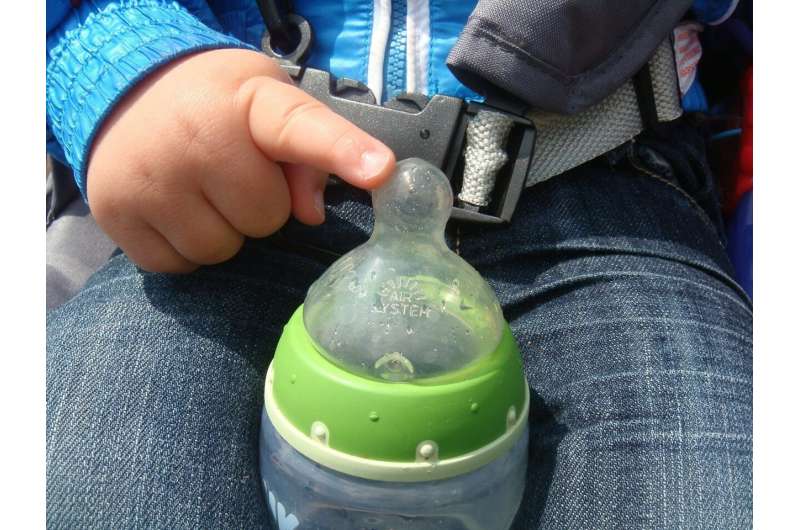This article has been reviewed according to Science X's editorial process and policies. Editors have highlighted the following attributes while ensuring the content's credibility:
fact-checked
peer-reviewed publication
trusted source
proofread
New report spills the milk on toddler 'formulas,' questions marketing of drinks

Toddler "formulas" that are promoted as nutritious drinks for the older infant or preschooler are generally unnecessary and nutritionally incomplete, and the marketing practices that promote them are questionable, according to the American Academy of Pediatrics.
The AAP has published a new clinical report, "Older Infant-Young Child 'Formulas,'" that reviews the growing array of drinks aimed at children ages 6–36 months and observes that they lack standardization or regulatory oversight. The clinical report, developed by the AAP Committee on Nutrition, will be released on Friday, Oct. 20, during the 2023 AAP Conference & Exhibition in Washington, D.C.
"Products that are advertised as 'follow-up formulas,' 'weaning formulas,' or 'toddler milks and formulas,' are misleadingly promoted as a necessary part of a healthy child's diet, or for those directed at young infants, equivalent to infant formula," said lead author George J. Fuchs, III, MD, FAAP, a member of the Committee on Nutrition, which produced the clinical report.
"These drinks should not replace a balanced diet and are inferior to standard infant formula in children less than 12 months of age and offer no benefit over much less expensive cow's milk in most children older than age 12 months. Some children may have special nutritional needs, as well, and so as with any child, it is always best to check with your pediatrician," Dr. Fuchs added.
The clinical report will be published in the November 2023 Pediatrics (published online Oct. 20).
The AAP supports continued breastfeeding along with appropriate complementary foods introduced at about 6 months, as long as mutually desired by mother and child for 2 years or beyond. If the infant is not breastfed, the AAP and others recommend whole cow milk as suitable for infants beginning at 12 months of age as part of a nutritionally complete, balanced diet.
Although medical or therapeutic formulas are indicated for a variety of conditions, such as chronic gastrointestinal diseases, metabolic disorders, food allergy, and others, such prescribed formulas are different from older infant-young child "formulas."
"It's understandable that families and caregivers may be confused by the different names, compositions, and purported benefits of these so-called 'formulas,'" said Steven A. Abrams, MD, FAAP, co-author of the report. "Some of the toddler drinks are high in sugar. And to top it off, they are typically more expensive than cow's milk."
As of now, the U.S. has no regulatory oversight to ensure that formulas for this age group adhere to any set of uniform standards.
The AAP recommends:
- For infants younger than 12 months, the liquid portion of the diet should be provided by human milk or standard infant formula, which in the U.S. have been reviewed by the U.S. Food and Drug Administration based on the Infant Formula Act.
- For toddlers (children 12 months and older), caregivers should provide a varied diet with fortified foods to optimize nutritional intake. Older infant-young child "formulas" can safely be used as part of a varied diet for children but do not provide a nutritional advantage in most children over a well-balanced diet that includes human milk or cow milk.
- Marketing of these drinks should make a clear and unambiguous distinction from standard infant formula in promotional materials, logos, product names, and packaging. They should not be placed alongside infant formula on store shelves.
- Pediatricians should complete a focused nutritional assessment of children and offer adjustment of solid food intake or vitamin supplementation as needed.
"We are all familiar with picky eaters. And there may be reasons why some families avoid cow's milk and dairy products," Dr. Fuchs said. "That's why it's important to ask your pediatrician to evaluate if children are getting all the nutrients they need. Together, you can discuss a plan to address any potential deficiencies."



















